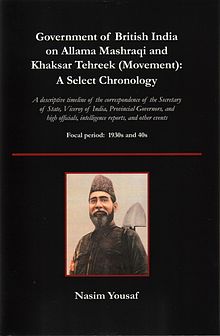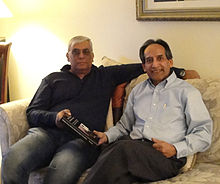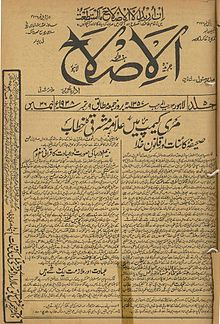- Nasim Yousaf
-
 Allama Mashriqi (Mashriqi with grandsons & Khaksars.Standing: Mashraqi is fourth from the right.Sitting: Grandsons (Author, Nasim Yousaf, is sitting in the center)[1]
Allama Mashriqi (Mashriqi with grandsons & Khaksars.Standing: Mashraqi is fourth from the right.Sitting: Grandsons (Author, Nasim Yousaf, is sitting in the center)[1]
Nasim Yousaf is a scholar, historian and intellectual.[2] He comes from a famous family of the Indian sub-continent and is a grandson of the pre-eminent Allama Mashriqi (world renowned scholar, mathematician and founder of the Khaksar Tehrik). He is also a nephew of globally recognized social scientist Dr. Akhtar Hameed Khan (both Allama Mashriqi and Dr. A.H. Khan were nominated for the Nobel Prize - Mashriqi for Literature for his book “Tazkirah” and Dr. Khan for Peace for his rural development and poverty alleviation projects).Mr. Yousaf has thus far written nine books,[3] five on the history of the Indian sub-continent and four on import and export. Both sets of books offer a unique contribution; his books on history uncover many hidden facts on the freedom of the Indian sub-continent, while his publications on trade help to increase the export of apparel, textiles, hand knotted rugs, housewares, gifts and decorative accessories from different parts of the world. In 2010, his book, “Government of British India on Allama Mashraqi and Khaksar Tehreek (Movement): A Select Chronology; A descriptive timeline of the correspondence of the Secretary of State, Viceroy of India, Provincial Governors, and high officials, intelligence reports, and other events. Focal period: 1930s and 40s”[4] was published. This publication is an unprecedented undertaking and provides a valuable contribution to the historiography of South Asia. It is a useful tool for researchers, educationalists, students, and journalists conducting research on the emergence of two independent states: Pakistan and India. His books are available in the collections of many university libraries around the world.
In addition to his books, Mr. Yousaf has also published many thought provoking articles and has presented research papers in scholarly conferences[5] in the USA. His articles have been published in globally renowned publications such as “Harvard Asia Quarterly”[5] and “World History Encyclopedia” (USA),[5] and in various newspapers in Bangladesh, Canada, Pakistan, India, Sweden, United Kingdom, and the USA.
Mr. Yousaf’s published works have changed the complexion of the current history of the Indian sub-continent and have added a new dimension to the independence episode. His research has compelled historians to re-visit the history of the region and correct the fabrication and elimination of many important facts. He continues his research today and has a number of forthcoming projects, including an important book entitled “Mahatma Gandhi & My Grandfather, Allama Mashriqi.” This upcoming title will discuss the role of Mashriqi and Gandhi in the freedom movement, their political differences, and the true driving force behind the liberation of British India in 1947.
Recognizing Mr. Yousaf’s achievements, “Marquis Who’s Who” (America's biographer since 1899) had previously published his biography in "Who’s Who in the World" (2001, 2003, 2004) and "Who’s Who in America"(2002).[6]
Contents
Papers Presented at New York Conference on Asian Studies (NYCAS)
- “Pakistan and India: The Case for Unification” (Cornell University, 2009) [5]
- "Freedom of British India through the Lens of the Khaksar Movement" (2007)[5]
Slide Show (powerpoint) at (NYCAS)
Slides on the activities of the Khaksar Movement were a presented at New York Conference on Asian Studies (NYCAS, 2007)[5] Video on YouTube
Research Paper
“India’s Partition in the Face of Opposition: An Unveiled Perspective” [5] published by “Harvard Asia Quarterly”
"Al-Islah" (Khaksar Tehrik weekly)
Allama Mashriqi’s grandson, Nasim Yousaf, has completed a massive undertaking to compile historic copies of the Khaksar Tehrik’s weekly newspaper, “Al-Islah,” into a digital format. Prior to this effort, “Al-Islah” had not seen the light of day since 1947 for political reasons. This publication is extremely important in understanding not only the history of the freedom movement of the Indian sub-continent, but also the true driving force behind the British transfer of power in 1947. By painstakingly compiling a digital version of the newspaper, Mr. Yousaf has taken an important step towards making the publication accessible to a wide audience.
“Al-Islah” was originally founded in 1934 by Allama Mashriqi (founder of the Khaksar Tehrik) and launched from Lahore. It quickly established a large following, including subscribers in British India, England, Bahrain, Egypt, Nigeria, South Africa, and Saudi Arabia. “Al-Islah” played a key role in spreading Allama Mashriqi and the Khaksar Tehrik’s ideology and helped Mashriqi raise a well-disciplined private army of 5 million. In addition, “Al-Islah” inspired other Muslim as well as non-Muslim organizations to follow the Khaksar Tehrik and form similar organizations. The newspaper is essential to a complete understanding of the freedom movement because it describes the critical role played by the Khaksar Movement in bringing independence to the nation; without access to this publication, there would remain a large gap in the knowledge of the freedom movement. Thus, the digital compilation of “Al-Islah” is indeed momentous, as it will enable professors, students, researchers, historians and others to further study Allama Mashriqi’s role in the struggle for the freedom of British India and emergence of Pakistan and India as two separate countries.[7]
Articles
Articles on Allama Mashriqi:
- “Dr. Akhtar Hameed Khan and President Barack Obama’s Mother, Dr. S. Ann Dunham"[5]
- “Einstein and other scientists' meetings with Allama Mashriqi”[5]
- "Lessons from India's Partition",[8]
- "Lessons from India's Partition",[9]
- “World History Encyclopedia” (USA) includes Nasim Yousaf’s articles on Allama Mashriqi and the Khaksar Movement (Khaksar Tehrik).[5]
- “Allama Mashriqi’s Warnings — The Time Has Come To Wake-up”[5]
- “Allama Mashriqi & Mahatma Gandhi” [5]
- “Allama Mashriqi — A Giant Among Men” [5]
- “Allama Mashriqi the Great - A Hero of All Times” [5]
- “Allama Mashriqi Maliciously Implicated in Murder Case” [5]
- “The Historic Lahore Murder - March 19, 1940” [5]
- “Man At War With His Own Species” [5]
- “Behind the 1940-41 Ban on the Khaksar Tehrik” [5]
- “Allama Mashraqi and the Unity of Mankind” [5]
- “Allama Mashriqi Desired to Erase Sectarianism” [5]
- “41st Death Anniversary - In memory of Allama Mashriqi (The Statesman, Peshawar (Pakistan), dated August 28, 2004)” [5]
- “The Khaksar Martyrs of March 19, 1940” [5]
- “Allama Mashriqi’s Historic Car: A Symbol of a National Heritage in Ruin” [5]
- “Lessons from History”
Article on Hameedah Begum (daughter of Allama Mashriqi and wife of Dr. Akhtar Hameed Khan):
- “Hameedah Begum – The Woman Behind the Great Dr. A.H. Khan” [5]
Miscellaneous:
- “Tribute to Khaksar Leader Hameeduddin Ahmed Al-Mashriqi” [5]
- “A Distorted History (Letter)” [5]
- “Why Democracy Failed in Pakistan (this piece was circulated among the participants of the Tufts & Harvard Universities Conference, held in 2007)” [5]
Articles on Nobel Peace Prize Nominee Dr. Akhtar Hameed Khan (who pioneered Microcredit & Microsavings):
- “Dr. Akhtar Hameed Khan — An Inspirational Social Scientist” [10]
- “Remembering Dr Akhtar Hameed Khan’[10]
- “Dr. Akhtar Hameed Khan’s Vision of Development through Self-Reliance” [11]
- “Dr. Akhter Hameed Khan - The Pioneer of Microcredit” [11]
- “7th Death Anniversary – A Tribute to Dr. Akhter Hameed Khan”[11]
Bibliography
 “Government of British India on Allama Mashraqi and Khaksar Tehreek (Movement): A Select Chronology; A descriptive timeline of the correspondence of the Secretary of State, Viceroy of India, Provincial Governors, and high officials, intelligence reports, and other events (Focal Period: 1930s and 40s)”
“Government of British India on Allama Mashraqi and Khaksar Tehreek (Movement): A Select Chronology; A descriptive timeline of the correspondence of the Secretary of State, Viceroy of India, Provincial Governors, and high officials, intelligence reports, and other events (Focal Period: 1930s and 40s)”
- “Government of British India on Allama Mashraqi and Khaksar Tehreek (Movement): A Select Chronology; A descriptive timeline of the correspondence of the Secretary of State, Viceroy of India, Provincial Governors, and high officials, intelligence reports, and other events (Focal Period: 1930s and 40s)”
- “ Hidden Facts Behind British India’s Freedom: A Scholarly Look into Allama Mashraqi and Quaid-e-Azam’s Political Conflict “
- “Pakistan's Birth & Allama Mashraqi: Chronology & Statements, Period 1947-1963”
- “Pakistan's Freedom & Allama Mashriqi: Statements, Letters, Chronology of Khaksar Tehrik (Movement), Period Mashriqi's birth to 1947”
- “Allama Mashriqi & Dr. Akhtar Hameed Khan: Two Legends of Pakistan”
- “Import & Export of Hand Knotted Oriental Rugs Part I: Export to U.S.A. Part II: Import from Pakistan”
- “Export Housewares, Gifts & Decorative Accessories to the United States of America”
- “Importing Gifts, Housewares & Decorative Accessories from Hong Kong”
- “Import & Export of Apparel & Textiles: Part I: Export to the US Part II: Import From Pakistan”
References
- ^ Allama Mashraqi (founder of Khaksar Tehrik)
- ^ ‘Need to elect selfless leaders with broad vision’
- ^ Nasim Yousaf's books
- ^ Book: Government of British India on Allama Mashraqi and Khaksar Tehreek | Facebook
- ^ a b c d e f g h i j k l m n o p q r s t u v w x y z aa Allama Mashraqi (founder of Khaksar Tehrik)
- ^ Mr. Nasim Yousaf - Author, Historian, Businessman
- ^ http://www.amzpublications.net/images/DIGITIAL_VERSION_OF_HISTORICAL_AL-_ISLAH_-_AMZ_WEB_FILE.pdf
- ^ http://www.bangladesh-web.com/view.php?hidRecord=358766
- ^ IndianMuslimObserver.com: Lessons from India’s Partition
- ^ a b Nobel Peace Prize Nominee Dr. Akhtar Hameed Khan
- ^ a b c Nobel Peace Prize Nominee Dr. Akhtar Hameed Khan
External links
- Allama Mashraqi (founder of Khaksar Tehrik)
- Nasim Yousaf's books
- Nasim Yousaf | Facebook
- Mr. Nasim Yousaf - Author, Historian, Businessman
- Allama Mashriqi Founder of the Khaksar Movement (Tehreek)
- Amazon.com: Nasim Yousaf: Books, Biography, Blog, Audiobooks, Kindle
Categories:- Living people
- American people of Pakistani descent
- Historians of South Asia
- Muslim scholars
- Naturalized citizens of the United States
- Pakistani historians
- Pakistani emigrants to the United States
- Pakistani scholars
- Pakistani writers
- Pakistani political writers
- Historians of India
Wikimedia Foundation. 2010.






